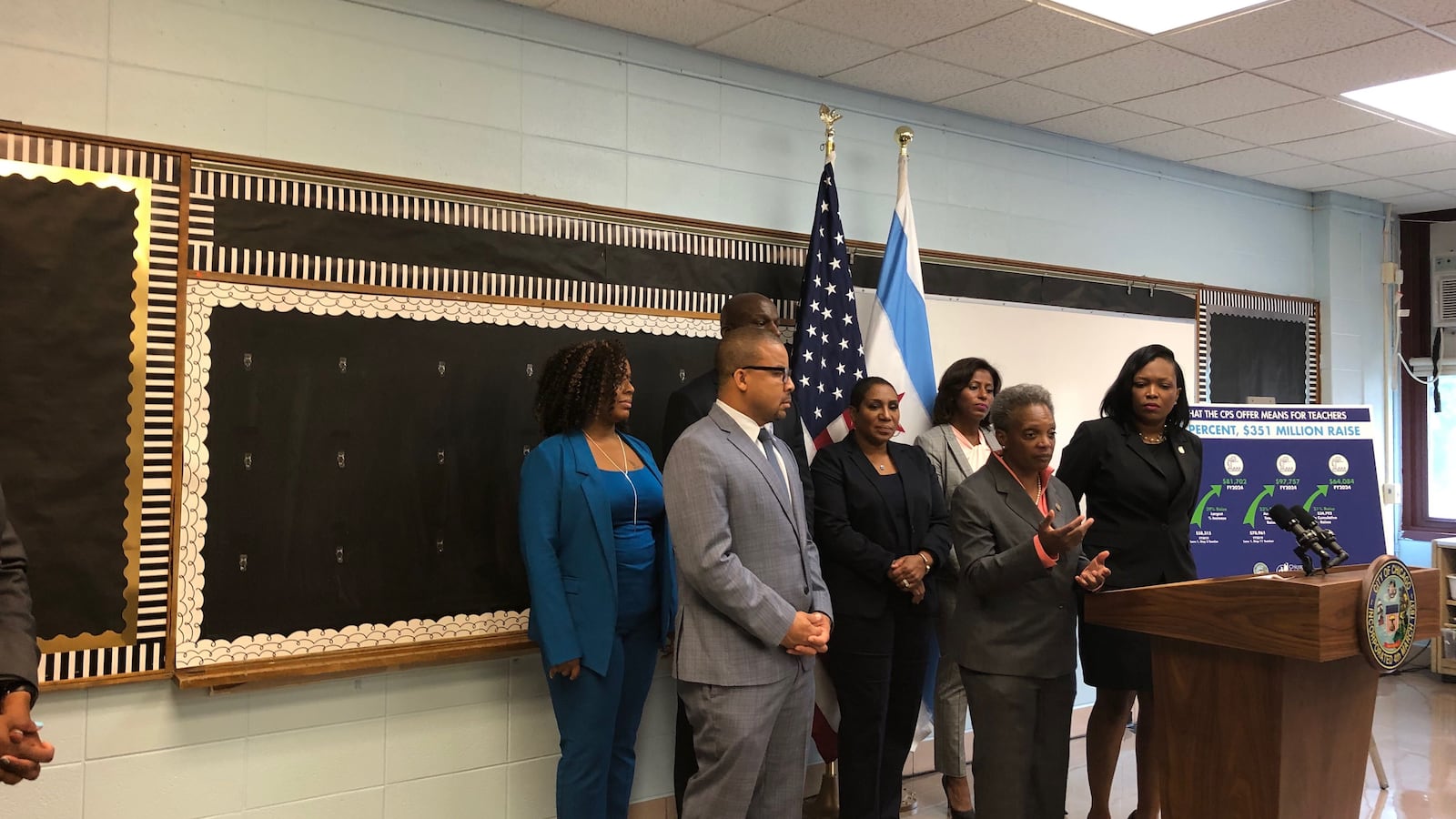On Wednesday, Chicago Mayor Lori Lightfoot celebrated her first 100 days in office by ticking off her accomplishments since taking office. When it comes to schools, those include a new school board that has made an effort to make dealings more transparent and an “equity-focused” budget for schools.
But one pressing item on her to-do list that remains unresolved is a contract with the Chicago Teachers Union. Her latest offer, unveiled earlier this week, would give teachers a 16% raise across five years — but the union is rejecting it.
Here are five things to know about Lightfoot’s offer and the future of the contract talks.
The city sweetened its offer this week — and notes that some teachers would get major raises.
Lightfoot’s latest offer is an increase over her previous public deal, which was 14% across five years. That represented the city’s acceptance of the recommendations from a third-party fact-finder, Steven Beirig, who urged a 16% pay hike.
Lightfoot’s team noted that, under her deal, the average teacher would see a salary increase of 24%, including the scheduled salary increases that teachers already receive based on years of service.
A second-year teacher, for example, would see her salary rise from $53,000 in 2019 to over $72,000 in the fifth year of the agreement, which is equivalent to a 35% pay raise, according to City Hall.
There are dark clouds on the city’s financial horizon.
Pointing to the city’s relatively rosy financial picture, the union argues that the city could offer higher pay, better benefits and more new staff than it has offered if it prioritized schools over other investments.
But while the city is in better shape than it has been, its finances are far from unshakable. The city faces a looming budget deficit of more than $700 million.
Lightfoot announced a city government hiring freeze last week in response to the deficit.
That freeze does not apply to the city’s sister agencies, such as Chicago Public Schools, her administration said in a statement, heading off concerns from teachers and others about whether the city will be able to add the new school staff it has promised.
Still, options to pay for a new contract are on the table.
The union wants the district to make a contractual promise to hire nearly 5,000 additional teachers, professionals and aides, at a cost of $880 million over three years. The union has argued that the city could afford its demands by dipping into “tax-increment financing” revenue, or TIF funds. Those are dollars generated by using taxes from specific neighborhoods where development is taking place to fund future improvements in those areas.
Lightfoot’s team told Chalkbeat in a statement that the city is still working out how it could pay for raises — but indicated that the union’s suggestion could be a possibility.
“The City is still evaluating how much is available in TIF surplus funds, and how these funds could be applied to balance several key priorities for the city,” city officials said in a statement. Those priorities include “the continued growth of our schools and neighborhoods.”
A city budget now doesn’t foreclose on improvements for teachers later — but the union is skeptical.
When Lightfoot announced her proposed budget, the city teachers union protested because only 2.5% raises for teachers were included. But Lightfoot says the city’s budget can be amended to reflect the terms of whatever contract deal is ultimately made.
In the past, the district has put out a supplemental budget on top of the general operating or capital budgets.
But the union isn’t taking the mayor on her word — they’ve doubled down on pushing Lightfoot to place staffing promises, in particular, into the union contract.
A strike remains possible, but city officials are striking a confident tone.
If the union and City Hall cannot reach a deal, the union has threatened to strike. The union’s rejection of the fact-finder’s report on Monday set a 30-day countdown for a potential strike.
But schools chief Janice Jackson has said she is confident that the district can avert a strike.
The pay offer from the district is “one of the largest increases in CTU history,” said Jackson. And while she was sympathetic to the pay freezes and furloughs teachers had faced in the past decade, Jackson said it was unfair to expect Lightfoot to make good on years of disinvestment in one contract.
“If we had all the money in the world we’d pay them the money professional athletes get,” said Jackson. “This is a fair contract given the financial constraints we have. We are moving in the right direction.”

